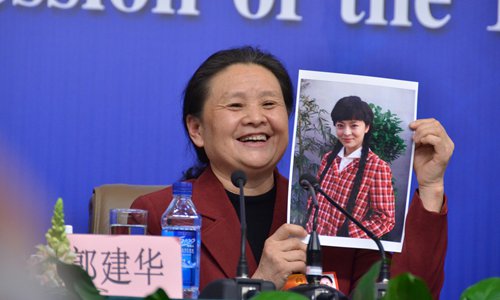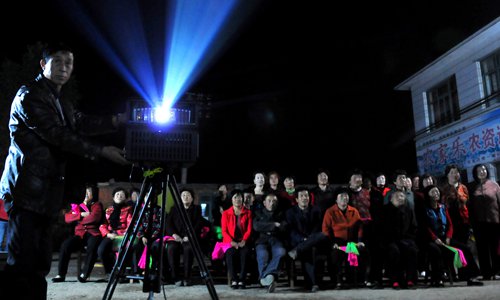
Guo Jianhua holds a picture of the protagonist in the movie based on her life. Photo: VCG
Whenever she is interviewed, Guo Jianhua will take reporters into fields and guide them through villages, encouraging them to chat with the farmers. For her, that is the best way to explain to them why she has spent her whole life screening films in rural areas.
Guo, a projectionist in Kaifeng, Henan Province, has been showing films for 44 years. Now 63, she has overseen 150,000 screenings in total, watched by tens of millions of viewers. It was a passion that was ignited by her first film watching experience at the age of 5.
Now her story has been made into a movie in memory of that golden era when films were shown in rural areas.
Projectionists used to play an important role in society, showing films in the open air in Chinese rural areas that lacked theaters and greatly satisfying farmers' need for entertainment. But since the 1990s, the demand for her services has dramatically dwindled, as TV sets, DVDs and video halls became more popular.
While this trend led to the closure of many film projection companies, Guo tried her best to keep her services going, believing that as going to the cinema was a normal part of city life, farmers should also have access to the silver screen.
Golden age
From the revolutionary films popular in the 1970s to films that reflect current social reality, Guo has witnessed the changes of time from behind her projector. She also tries her best to keep up with the times, updating her stock of films to meet the demand of the people who live in rural areas, who are mainly the elderly and children.
"I cannot get the market to adjust to me. I need to adapt to the market," Guo told The Beijing News.
Guo still remembers her first experience of watching a film when she was 5. At that time, the arrival of projectionists was such an exciting event that farmers would throng into the open ground and people would climb haystacks, trees and walls to get a view of the movie.
When she went home, Guo told her parents that she wanted to be a projectionist when she grew up. When the nation started to employ the first group of projectionists in 1973, she tried her luck and succeeded. That was when her career began.
From 1973 to 1993, Guo put on 13,000 screenings. Sometimes she did not finish work until the early hours of the morning. But she felt extremely happy, because "you can feel that you brought happiness to the people."
One of her favorite moments was when she flicked the switch, the film started, and the whole crowd immediately went quiet.
But her happiness did not come without a price. In 1978, the revolutionary film Red Rock was so popular that it was shown in villages six times in a single day. Guo, then seven months pregnant, had to work long hours every day, which eventually led to a premature birth. Doctors even feared that the baby, only two kilograms at birth, would not survive.
Guo's husband also made sacrifices, giving up his career in the army and a chance for promotion, instead staying in the village with Guo. At the time, it was hard to understand the decision.
"Both my husband and my daughter have paid a price. Sometimes I ask myself if it was worth it." said Guo. But the minute she arrives at a screening venue, she feels that it is. "No matter how crowded the place is, people would make way for me the minute I showed up. They were eager for films."
Guo recalled that at the time, people lacked food and clothing, so she could not bear to see them go "culturally hungry" either.

Farmers watch a film in a village in Dalian, Liaoning Province in 2011. Photo: VCG
Changing times
When it came to the early 1990s, however, Guo found that the service that she had dedicated her life to was starting to lose its market appeal.
At that time, video halls in the townships and counties were booming, and VCDs and DVDs were becoming popular in rural areas. Few people would turn up for a film if it showed in the countryside. Many film projection companies closed down.
In 1996, the company that Guo worked for also faced bankruptcy. People around her suggested she change her job. But Guo refused to believe that films were not needed anymore. "When I went to show films, there were still elderly people and children waiting for me," said Guo, "I couldn't forget about them just because films were no longer popular."
Guo decided to take over the company and became the manager. The change of role made her think more about how to keep the company afloat. To make money, she started to take commercial orders for wedding and funerals, which eventually allowed the company to survive.
"Things are much better now. In the past, we pulled handcarts, then we drove tractors, and now we drive cars to screen films," said Guo, adding that she feels content if she is able to keep showing films for farmers.
Keeping in touch
Meanwhile, Guo continues to pay attention to what farmers really want. For elderly people left behind as their children seek work in cities, she shows stories close to life and local operas. For children, she puts on films about law to guide them onto the right path.
In more than 100 projection stations across villages, she has held over 30,000 screenings about left-behind children and awareness of how to prevent fraud, which have been watched millions of times.
On a more practical level, she also plays instructional films to farmers about how to plant various crops.
As a deputy to the 11th and 12th National People's Congress, Guo suggested the government build theaters in rural areas so that farmers could enjoy watching films.
At the annual two sessions in 2016, when journalists surrounded her and took photos, she asked them to take photos of the peanuts she was carrying, as they were specialties of Guo's hometown in Kaifeng.
Every time before a film starts, Guo plays some music while the villagers dance and beat drums. Guo suggested that the local government promote this kind of entertainment among villagers. "When more people join in dancing and drumming, fewer people will gamble."
"The more I learn about the positive side of showing films for farmers, the more motivated I become," said Guo, who is more passionate about her work than ever.

